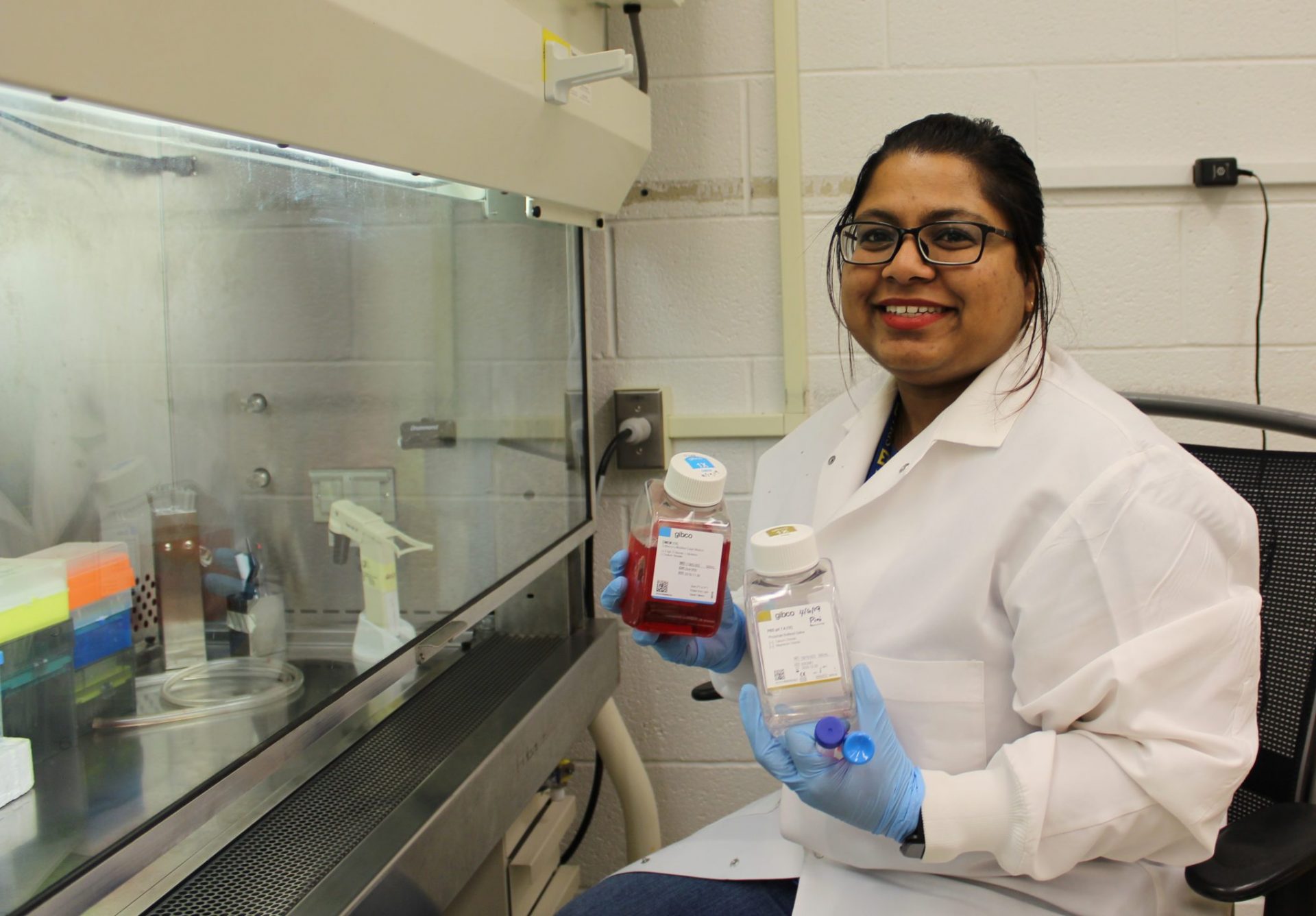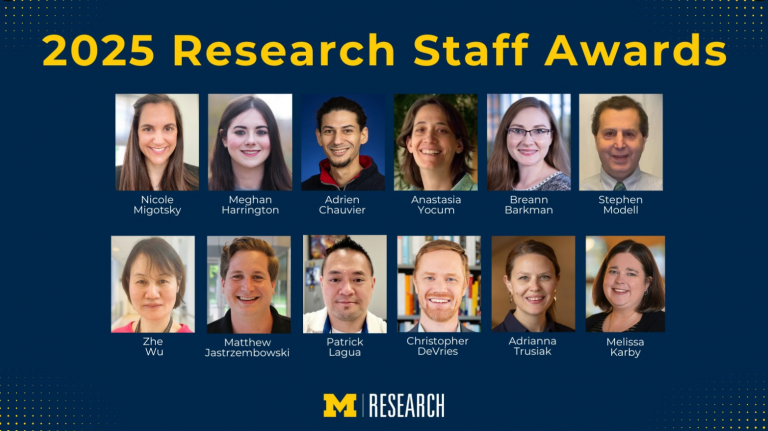Being and belonging: science and community
 The scientific journey of Bambarendage (Pini) Perera, Ph.D., Research Assistant Professor of Environmental Health Sciences, School of Public Health
The scientific journey of Bambarendage (Pini) Perera, Ph.D., Research Assistant Professor of Environmental Health Sciences, School of Public Health
Diet, exercise, or environmental exposures have an impact on how our genes are activated or silenced. These factors do not permanently affect our DNA, but they can interfere with our gene expression by acting upon RNA regulation mechanisms. These phenomena comprise “epigenetics,” a field of research that fascinates Bambarendage Pinithi (Pini) Perera, Ph.D., Research Assistant Professor in the department of Environmental Health Sciences of the School of Public Health, and a new member of the Center for RNA Biomedicine. Through epigenetics research, she sees the opportunity to contribute to society, and to scientifically inform the public and stakeholders about the benefits and risks of environmental exposures.
Dr. Perera is particularly interested in embryonic development and the effect of environmental exposures during pregnancy. In this context, she studies the consequences of toxic exposures on imprinted genes—these are normal monoallelic genes, meaning that only one of the two parents’ genes is activated—and RNA regulation processes.
For example, exposure to lead can impact piwi-interacting RNAs (piRNAs). These small RNAs are highly expressed in the germ line (testes or ovaries), and can interact with a piwi protein to silence transposons (or “jumping genes”). These characteristics set a very important role for piRNAs in reproduction. Recent research has found that piRNAs are also expressed in somatic tissues, including the hippocampus region of the brain responsible for maintaining long-term memory. “There are still a lot of unknowns about piRNAs,” said Dr. Perera. In the brain of animals that had been exposed to lead, the team has found several piRNAs that had been downregulated.
In 2016, Dr. Perera became a postdoctoral fellow in the lab of Dr. Dana Dolinoy, Ph.D., NSF International Chair & Professor, Environmental Health Sciences and Professor of Nutritional Sciences at the University of Michigan School of Public Health. With Drs. Jaclyn Goodrich and Laurie Svoboda, they form a strong team that studies the impact of chemical exposures on human health, in particular per- and poly-fluoroalkyl substances (PFAS), lead, and phthalates.
Mentors matter
Dr. Perera has a very deep appreciation for Dr. Dolinoy, a leader scientist in her field, and for all the women mentors that she has met on her long journey, from Sri Lanka where she grew up to Michigan, Washington, D.C., and Louisiana. She describes herself as having been a very curious child, raised by biology-oriented parents who worked in the military, and always used the “scientific method at home,” explaining and testing possibilities. “I was introduced to science at an early age from my parents and my teachers,” she added. “I was about 8-year-old when I learned about photosynthesis. My teacher demonstrated the impact of light on plants by covering a section of the grass with a black cloth, and another area with a clear cloth. Questioning nature and trying to figure out why things happen were instilled in me very early.”
As she continued to apply her relentless curiosity in high school in Colombo, the capital city of Sri Lanka, Dr. Perera was very intrigued by DNA and RNA. She wondered if and how our behavior can impact our genes. She also smilingly commented that her inquisitive attitude was fueled by The X-Files’ character Dana Scully, a female doctor/investigator whose skepticism and scientific mind were a real source of inspiration for teenaged Perera.
However, molecular biology was not a curricular option in Sri Lanka around 2006. Her father had a professional opportunity which brought the family to the US when she was 17, and this move also allowed her to follow her interests in DNA and RNA. A native speaker of Sinhalese, she spent her first year in America translating the science she knew into English. She did not formally graduate from high school but acquired her GED, and then attended a small community college in Louisiana. She transferred to the University of New Orleans as an undergraduate student and moved to Baton Rouge for her Ph.D. at Louisiana State University with Dr. Joomyeong Kim, where the focus of her studies converged on epigenetics.
Empathy is the connector
Dr. Perera attributes her empathetic nature to her complex international and academic experiences that had many challenges. As a woman in science, a transfer student, a non-native speaker of English, and a migrant, she feels that she can easily step into others’ shoes and support many students and colleagues to become successful scientists. She is also committed to building communities, helping each other out, and balancing life and work. She is an active contributor to her departmental diversity, equity, and inclusion committee. “DEI is very dear to my heart,” she commented.
Dr. Perera believes that through empathy, we can manage the reality of a very competitive career with deadlines, grant submissions, and production pressure while being supportive of each other, dedicating ourselves to the team’s moral, and seeking collaborations. For her, well-being and healthy individuals and communities are a very important indicator of success.
“We want a community that is healthy and happy, and I’m striving to contribute and make a difference.”
“We need a community that is not only encouraging of good science, but that is also supportive of setbacks, rejected papers, or grant application failures. There are many failures in science, and we should take time to learn from them to build toward our future successes. They give us a moment to reflect, gain more perseverance, and rise above our shortcomings.”
“Failures should be looked at in a positive way.”
Dr. Perera also pointed out that there are always several authors in a scientific publication. “It is a shared accomplishment, and it is the team that makes it work.” One of her motivations to come to Michigan is its collegial environment, and her connections with women who lead and practice outstanding science. She feels very fortunate to have found such supportive and inspiring women as she commented that “it takes a lot more for a woman to thrive in science and in academia.”
See Pini Perera’s “featured scientist” profile

